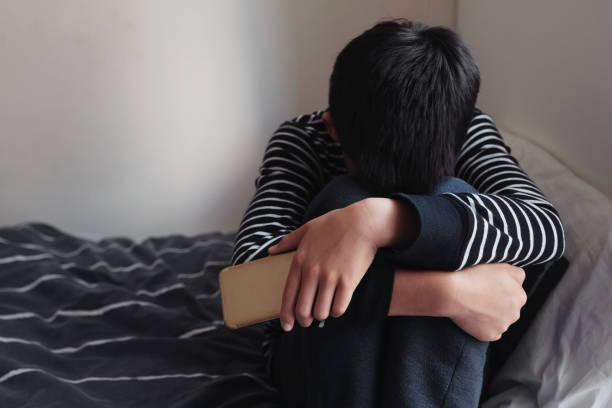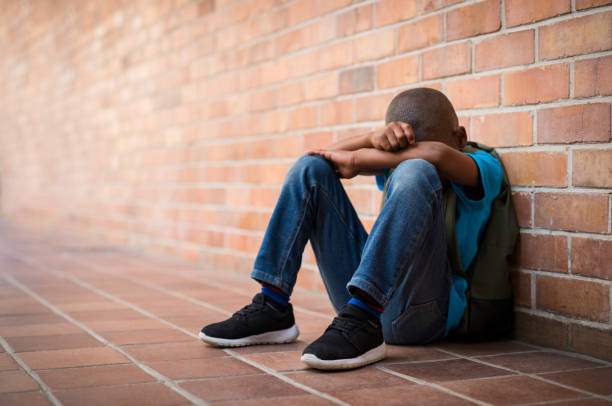Childhood psychosis is a disorder that is characterized mainly because the child who suffers from it experiences a serious alteration in the perception of reality, in their thoughts and emotions.
Children suffering from infantile psychosis are not able to differentiate between the external world and their fantasies, that is, they may come to believe that it is really happening or take for granted events that are imaginations and that are not really true, hear noises or see things that aren't real either.
The first symptoms of childhood psychosis usually appear at 3 years of age, but given the similarity they have with some behaviors of other disorders such as schizophrenia or autism, it is difficult to diagnose and is usually not detected until the age of 12.
The main symptoms of childhood psychosis

These are the main symptoms of this childhood psychiatric disorder:
Hallucinations and delusions

One of the main symptoms of infantile psychosis occurs when the child notices sensory experiences through sight, hearing, or touch, which do not correspond to external stimuli.
That is, when the child believes he has heard, seen, and even touched something that does not exist. For example, that you hear the blow of a hammer, or feel that something or someone has touched you.
As I mentioned before, delusions occur when the child believes that situations that are not real are happening or takes for granted.
Resistance to change and difficulty relating

Another of the symptoms of childhood psychosis that a child experience is that they usually show great resistance to changes.
The children who suffer from this disorder have an enormous difficulty in adapting, for example, new relationships, changing schools, or moving house. They react negatively, and are unable to get used to any type of situation.
Language disturbances

At the age of three or four years, a child is already capable of developing basic language, but in the event that he suffers from childhood psychosis, it may take much longer to learn the basics of communication, and even in some cases, that there is a total absence of language, pronominal inversions, distortions or echolalia.
Motor development

Another symptom of childhood psychosis is the delay or poor development of the child's motor skills. It is mainly characterized by mannerisms or lack of spontaneity, clumsy movements, or lack of harmony when moving and walking.
Not recognizing their own identity

When a child reaches three years of age, he begins to differentiate himself from the rest and assumes his own identity. One of the symptoms of childhood psychosis, which indicates that a child may be suffering from this disorder, is the inability to recognize their own identity or differentiate themselves from other people.
What are the types of childhood psychosis?

There are several disorders that can lead to the appearance of childhood psychosis, among them I highlight the following:
Schizophrenia
Schizophrenia is the leading cause of the development of psychotic disorders in children and adolescents, and it can be diagnosed at any age.
Children with a psychotic disorder derived from schizophrenia often have symptoms such as alterations in perception, hallucinations, or the difficulty or inability to experience feelings or emotions (affective flattening).
Brief psychotic disorder
The main symptoms of this type of childhood psychosis are hallucinations and delusions, but it is characterized mainly because they appear in a short period of time, about a month, and without prior warning.
Induced psychotic disorder
The induced psychotic disorder occurs when the adolescent takes substances such as alcohol, cocaine, or marijuana that have led to the onset of a childhood psychotic disorder.
Delusional disorder
The symptoms of this type of childhood psychosis are characterized by the fact that the child experiences hallucinations and delusions related to the bad perception of a past experience, that is, it is the exaggeration of a real situation.
Psychotic depression
It is a more serious type of depression since, along with the symptoms of this mental disorder, other symptoms of childhood psychosis appear, such as hallucinations and delusions.
What are the causes of childhood psychosis?

Although the exact causes of a child developing a psychotic disorder are unknown, many researchers argue that it may be due to a combination of different factors. The most common are:
- Genetic factors.
- History of a family member who has suffered from psychosis or some type of mental disorder.
- Those children who have grown up in environments that have negatively influenced their development, have had bad experiences or have not been able to count on the support of a close family member.
- The use of drugs or alcohol.
- That there is a difference between the structure and functions of the brain.
- Problems during pregnancy or at birth.






